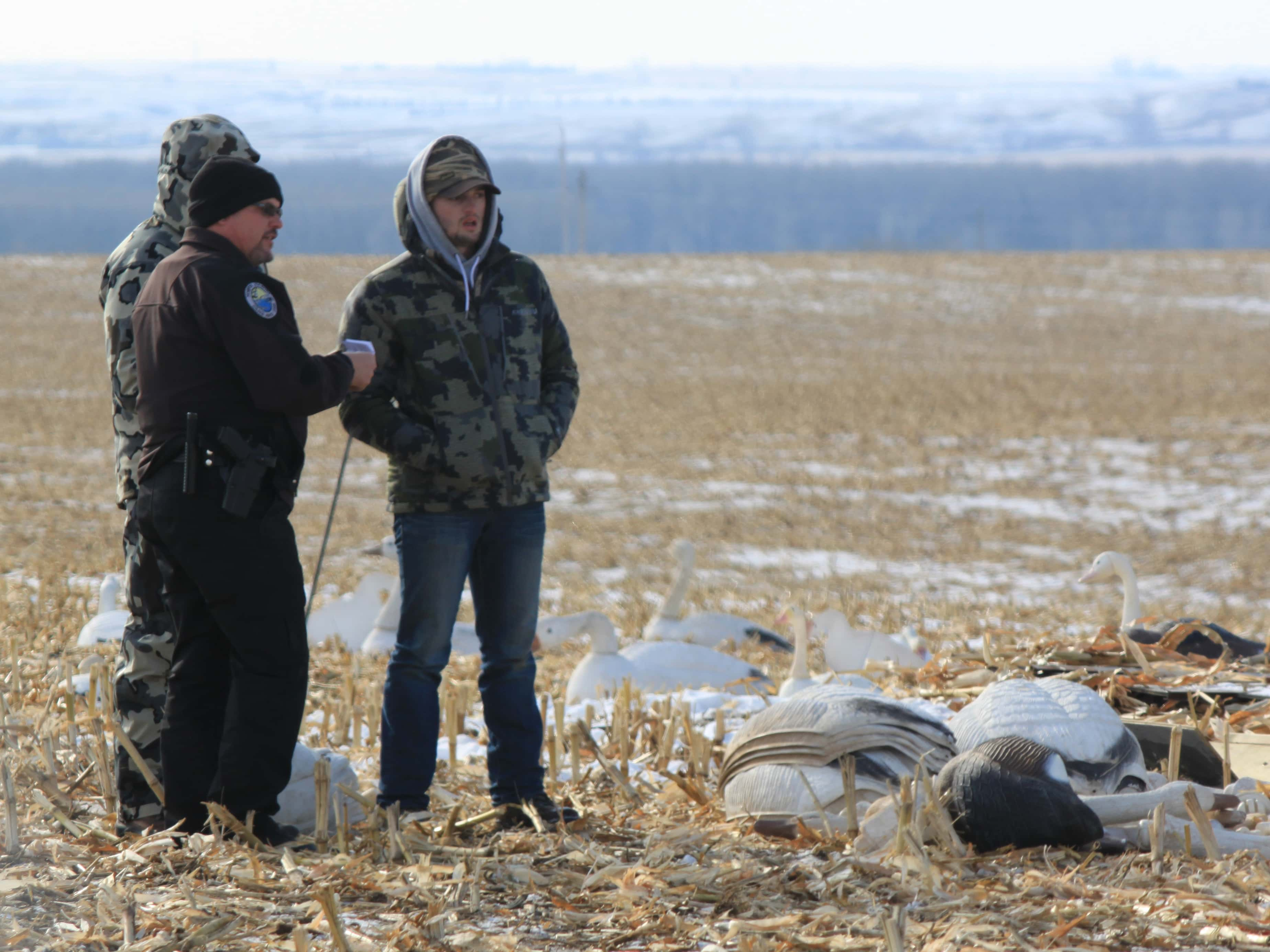
NDG&F Game Warden Corey Erck inspects the licenses of snow goose hunters near Wilton, ND in 2017. In the wake of the coronavirus pandemic, new technology helps wardens confirm licensure of hunters in the field and on the water this spring and limit exposure during this unprecedented time. Simonson Photo.
By Nick Simonson
With the impact of the coronavirus obvious across many layers of society, the North Dakota Game & Fish Department (NDG&F) has not been immune to changes in day-to-day life. Under guidance from the U.S. Centers for Disease Control (CDC) and orders from the Governor, all NDG&F offices and facilities have been closed to the public.
Despite that fact, the state’s staff of wardens and other officials tasked with monitoring the use of North Dakota’s game, fish and natural resources are carrying on, and it’s almost business as usual.
With recent trends showing a decline in violations, and economic conditions shifting day-by-day, NDG&F Investigations Supervisor Scott Winkelman suggests the employees are ready for anything.
Behind the Numbers
Poaching and other game and fish related offenses are rarely uniform, with a number of motives, from intentional taking of animals, to mistaken identification of species and boundaries being some of the reasons. On the other side of the coin, the reasons for the recent decline in violations – down nearly 8 percent from 2017 to 2019 – also vary.
“It’s hard to determine why citation numbers may be up or down in any particular year,” Winkelman relates, continuing that “it could be related to several factors such as weather, game populations whether they’re up or down, whether we have open positions or not.”
Currently, the department is short-staffed on the warden front, but anticipates hiring for open positions. The NDG&F holds its annual warden exam in May, and subject to situational circumstances related to the current pandemic, the department plans on conducting the test at the same time this year, qualifying more candidates for employment in a position that typically covers up to 2,500 square mile areas consisting of one or two counties. While continued vigilance against the outbreak has impacted day-to-day office life within the department, Winkelman advises that wardens – whose jobs are often solitary and consist of significant time in the field – are continuing on much the same for the most part.
“Right now it hasn’t affected us, we’re currently patrolling as normal but we have advised all our wardens on CDC and North Dakota Department of Health precautions,” Winkelman explains, “luckily, with our computers and our trucks and people showing licenses electronically, we can mitigate some of those factors and still continue to do our jobs,” he continues, citing newer technologies helping to limit person-to-person contact for wardens in the course of their regular duties during this time.
Future Concerns
With recent drops in all major financial indices, thousands of workers applying for unemployment in the Peace Garden State and economic uncertainty looming, the idea that the illegal taking of game for profit or simply subsistence seems a likely possibility.
Documented instances of individuals from states such as California and Florida were caught illegally taking fish, game and shellfish, such as lobsters throughout the recession of 2008-2009, where animals were harvested and sold for profit. It is not likely though that those trends are as much of a concern in North Dakota, and looking ahead to an uncertain future, Winkelman doesn’t expect financial gain or personal sustenance to dominate the rationale for any future game violations, and the NDG&F is working to prepare wardens for the usual scenarios this spring.
“The spring fishing run will be picking up here, turkey season will be opening, and the wardens are used to that,” Winkelman relates, adding that the general public is the best ally in preventing and reporting game violations.
“Our citizens are our most important tool for observing and reporting game violations, there’s way more of them out there than there are of us, so if anyone does observe or suspects any poaching or game violations they should call the Report All Poachers line at 701-328-9921, and they can remain anonymous if they like.”

